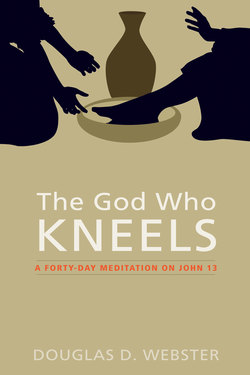Читать книгу The God Who Kneels - Douglas D. Webster - Страница 11
На сайте Литреса книга снята с продажи.
Day 6
ОглавлениеThe Mind of Christ
“Jesus knew that the hour had come for him to leave this world and go to the Father.” John 13:1
Jesus on his knees is not about a great man condescending to do a menial task in order to inspire his followers to be humble. This moralistic reading of John 13 skims the surface and misses the meaning of the text. What appears simple on the surface—a towel and basin, and the menial work of a servant—was intended by Jesus to reveal the unfathomable mystery of God’s great love and sacrifice. Jesus deliberately performs a prophetic act “that will interpret to the disciples that terrible event which they cannot now understand.”4 A moralistic reading of the text may inspire admiration for Jesus but it does so at the expense of theological truth. It is all about Christ’s atoning sacrifice and sacrificial discipleship.
A faithful pastor preached on “loving service” from John 13. He did a fine job presenting the necessity of foot-washing for a group of men walking the dusty dirt paths of Palestine in the first century. He emphasized the awkwardness around the table as none of the disciples deemed it their responsibility to take on the role of a servant and wash the disciples’ feet. No one was willing to humble themselves even though it was a breach of etiquette to recline at the low table with unwashed feet.
The preacher noted that Jesus’ loving service issued out of his fullness. Jesus didn’t need to be needed. There was nothing lacking in his life that needed to be fulfilled by giving himself away to others. To illustrate this the pastor said, “It is like the popular high school senior who goes out of her way to reach out to an unpopular girl.” But then he added, “I can’t say that of a junior high girl, because if a popular junior higher reached out to an unpopular student, she would immediately become unpopular.” His unintended aside unwittingly backed into the tension in the text. The illustration of the popular high school student who lowers herself to reach out to others fit his theme. Altruistic kindness has its rewards. Lower yourself to help others and people will think more highly of you. Servant-hearted kindness to those in need is love in action and cultivates self-respect. But the disciples were not buying this take on Jesus’ actions. They were embarrassed. The text forces us to go deeper.
What Jesus did in the upper room provoked the disciples’ disapproval, not their admiration. When Jesus strips down and begins to wash the disciples feet, he becomes, at least in Judas’ mind, like the junior high student who reaches out to the unpopular girl—despised and rejected. A disillusioned Judas, with his hopes dashed, must have been filled with disdain for Jesus. The prophet Isaiah summed it up this way: “Like one from whom people hide their faces he was despised, and we held him in low esteem” (Isa 53:3). Ted Turner, the founder of CNN, famously said, “Christianity is a religion for losers. I don’t want anyone to die for me.”
John makes us aware of the immediacy of Jesus’ death. The movement of this entire scene is deeply theological. Foot-washing serves as an object lesson. It is Jesus’ final parable and its significance lies in the cross—Christ’s atoning death. The Passion Narrative begins now, hours before Gethsemane and the betrayal. John makes foot-washing and the cross one continuous expression of Jesus’ love.
John sets up this scene with a sevenfold emphasis on the meaning of Jesus’ death. He clearly intends something more than a story about service. Jesus’ foot-washing is a prophetic act symbolizing the redemptive cleansing that only he can provide. The meaning of God’s sacrifice and the method of God’s mission are proclaimed visually and verbally by the God who kneels. In the upper room Jesus on bended knee illustrates divine cleansing and new commandment love. John’s austere narrative does this deftly without belaboring a point. The Apostle John begins with the Passover, God’s long-standing redemptive reference point, to frame all that is said and done. With poetic intensity and simplicity, John links the Passover to the soul-cleansing power of the atonement. He causes us to think of Jesus, the Passover Lamb who takes away the sin of the world. Loving service is rooted in the atonement.
Upper Room Reflection
Why does a moralistic take on Jesus’ actions fall short?
Can you identify with the disciples’ embarrassment over Jesus’ actions?
What aspect of the Christian life remains difficult for you to accept?
Can you explain why this is more than a good story about service?
4. Newbigin, The Light Has Come, 167.
